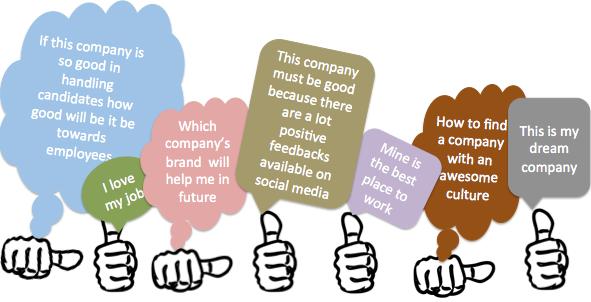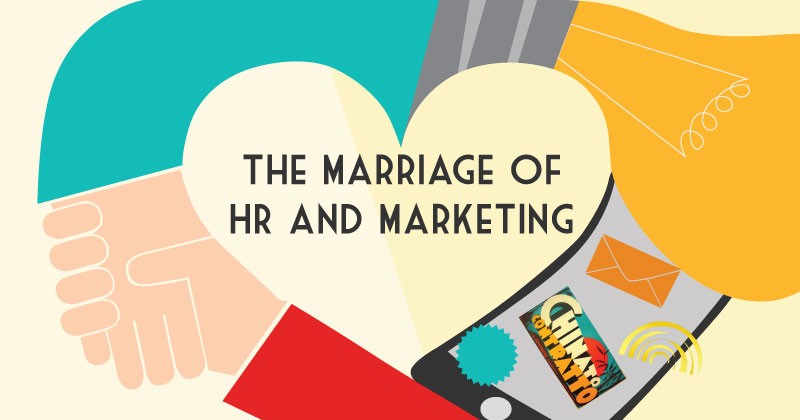
A recent research by Business Insider showed that about 51% of companies have a working employer brand strategy in place. According to LinkedIn Global Recruiting Trend 2016, 59% of talent leaders are investing more in their employer brand compared to last year.
Why employer brand matters?

More than attracting talent, a strong employer brand brings a lot of benefits to your organization:
- Make your company win in global talent war
- Boost current employees' engagement
- Retain top performers; reduce the cost of employee turnover
- Increase satisfaction of customers, shareholders and other partners
Employer brand is becoming a competitive advantage to differentiate companies. Google, Microsoft and American Express are 3 out of 10 best multinational workplaces for 2015 ranked by Great Place to Work. Google also win the No.1 position in the list Fortune's 100 Best Companies to Work for 2015.
Who should be in charge of employer branding strategy?
A successful employer branding strategy needs the key roles of C-level executives, human resources and marketing. Of course, it never works without the proactive involvement of current employees.
In every perspective, employer brand must align with the organization's culture and core values. To get started, it requires the orientation of top level managers in the organization's hierarchy. The core values are translated into the company's policies, strategies and daily activities of employees, who are the most effective brand ambassadors of each organization. Put it simply, employee experience is the key of employer brand. The direct participation of human resources in every single stage of employee lifecycle is the reason why HR plays a crucial role in employer branding.

Your company's public profiles on social media should be the medium to lure the best candidates by sharing a transparent insight of corporate culture and daily employee activities. Besides, your company's website is an important channel to communicate with potential employees. A strong employer brand also has power in keeping current employees engaged and retaining the best talent. A recent LinkedIn report showed that companies with a strong employer brand have a turnover rate 28 percent lower than companies with a weak or non-existent one. Moreover, employer brand is a powerful tool to generate employee referrals, one of the most important talent sources.

In modern human resources, HR activities are more and more integrated with marketing department. Employer brand couldn't separate from corporate brand and consumer brand. Thus, HR and Marketing have to share the responsibility for fulfilling corporate goals. Employer brand is the product; current and potential employees are customers in employer branding. HR and Marketing have to cooperate to answer these following questions:
- Why do current and potential employees want to work for your company? Why did ex-employees leave your company?
- What are common characteristics and traits of top performers at your company? What are their expectations?
- What makes your employer brand different from other competitors? What are the perceptions of working for your company in the labor market?
- To what extent do your current employees satisfy with their experiences of working at your company? Are they willing to introduce their referrals to work for your company?
Once you clearly understand your customers, you will take the proper actions to make your product successful. As the approach of product marketing, HR needs to adopt employer branding across employment lifecycle, from attracting, hiring, onboarding to engaging and retaining talent. It's not about recruiting and keeping the most qualified candidates but the right talent.
Is employer branding just a new fashionable trend or becoming the future of HR?

Employer branding is one of the most raised issues in HR community in recent years. There's no doubt that employer branding is an effective way to attract and retain talent. Yet there remain different opinions on its tenure. Is it worth to invest more in the long term or just a flash trend in the short term? In my point of view, employer branding is definitely not a program or a project. It is a long journey, which requires more and more efforts of not only internal but also external stakeholders to increase employer reputation.
The world is changing day by day, and the talent war is becoming more severe around the globe. In this competition, I believe that employer branding is putting into center of organizational concerns to achieve the bottom line. Also, the marriage of HR and Marketing to strengthen employer branding will be the right approach in human resources management. However, HR will be split into more specialized functions along with the development of employer branding in the future. Despite the influence of labor market situation, employer branding will be the wings for organizations to win overall success.












Replies to This Discussion